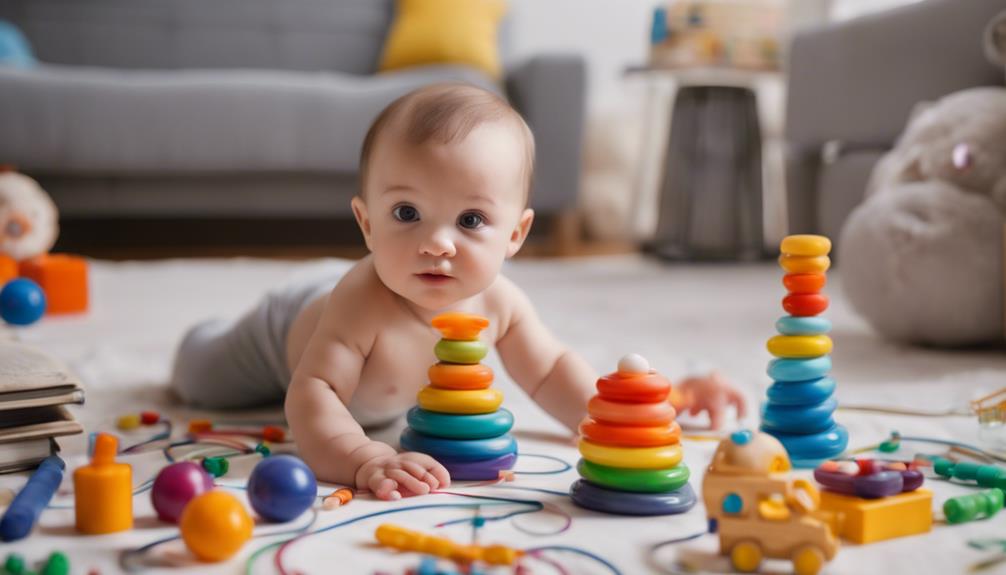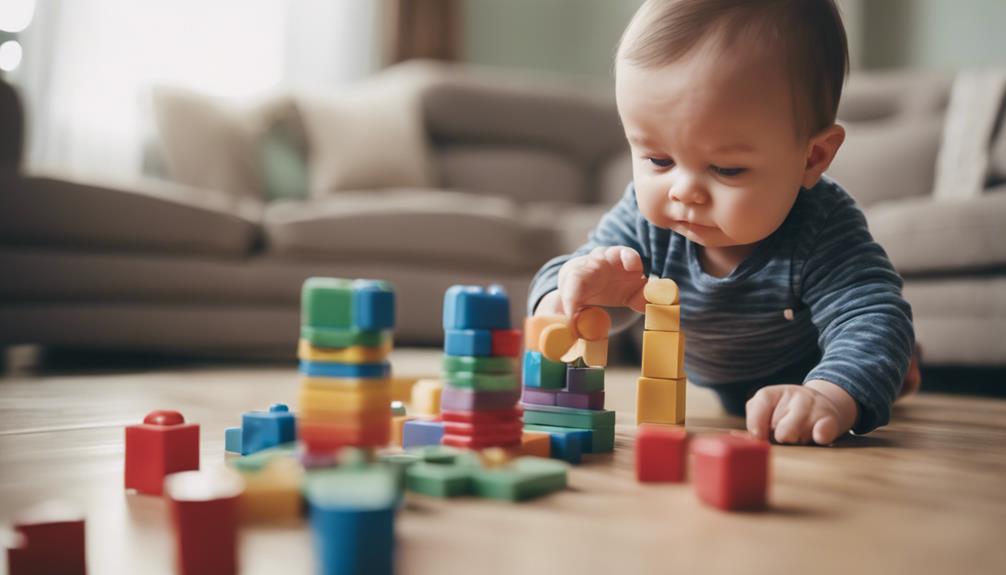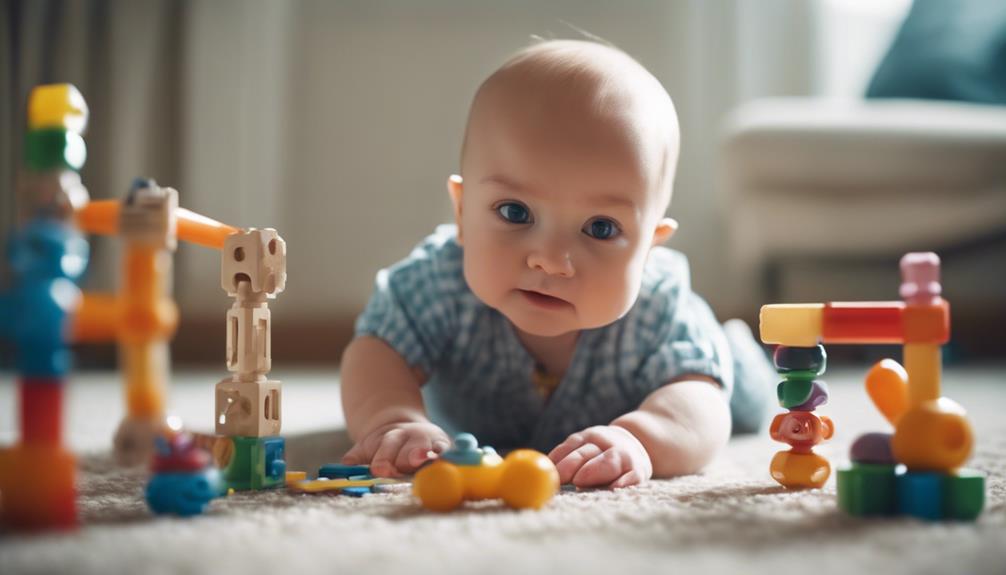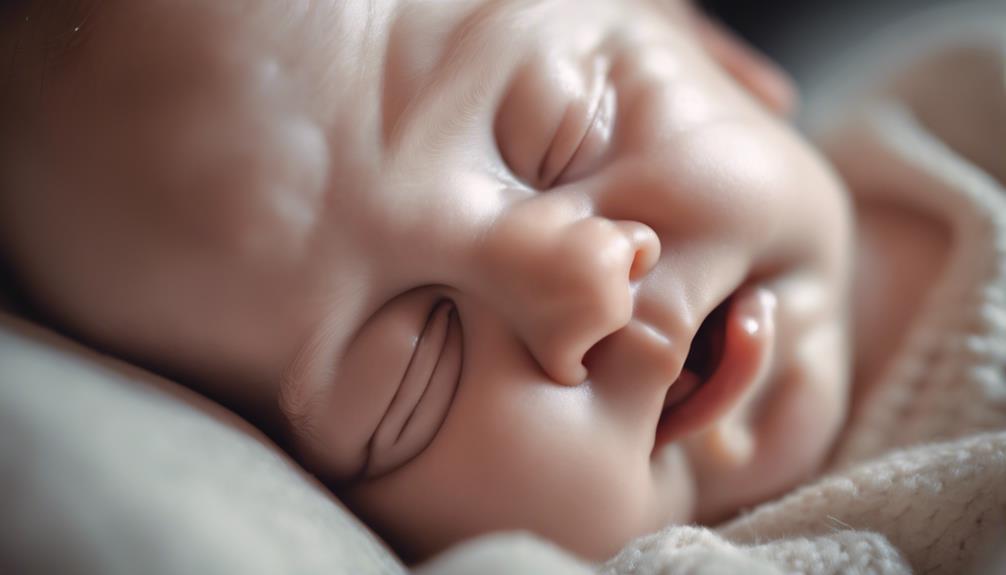When your baby engages in sustained eye contact, seeks physical closeness, and lights up with joy upon your return, these heartwarming clues indicate their love and attachment to you. Mutual gaze signifies trust and recognition of you as a source of comfort. Seeking physical closeness shows deep trust and affection. Excited reactions demonstrate a strong emotional bond. Their happy smiles, coos, and reaching out are ways of expressing love. Imitating your gestures is a clear sign of building trust and affection. Seeking reassurance and security reflects their need for love and attachment. These behaviors reveal your baby’s deep affection for you.
Key Takeaways
- Eye contact and mutual gaze show love and trust.
- Seeking physical closeness indicates attachment and trust.
- Excitement upon return reveals a strong emotional bond.
- Emotional expressions and imitation signify affection.
- Seeking reassurance demonstrates love and trust.
Baby Makes Eye Contact
Babies establish a connection with their caregivers by making eye contact as early as a few weeks old. When your baby locks eyes with you, it's not just a random gaze. This eye contact signifies a deep connection, a bond that's essential for their emotional development.
The act of looking into your eyes shows that your baby recognizes you as a source of comfort and security. It's a way for them to express trust and love towards you, their primary caregiver.
Through eye contact, babies communicate their needs and emotions, creating a channel for interaction and understanding. This mutual gaze is a powerful tool for building attachment, fostering a strong and loving relationship between you and your little one.
As psychologist Dr. Smith explains, 'Eye contact is a fundamental element in building a secure attachment with your baby. It shows them that you're there, that you care, and that they're loved.' So, cherish these moments of eye contact with your baby, as they're laying the foundation for a lifelong bond filled with trust and love.
Seeks Physical Closeness
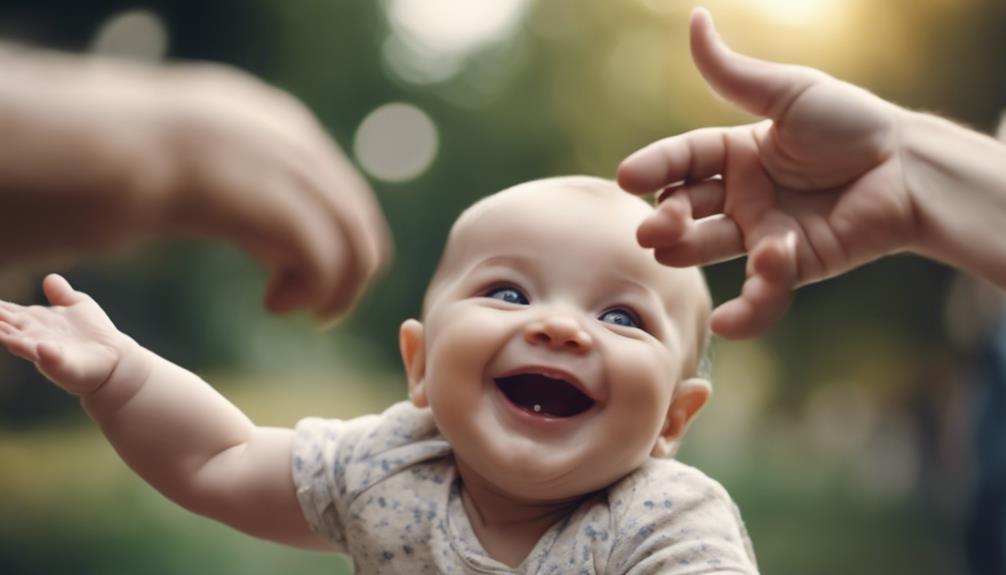
When your baby seeks physical closeness, they're expressing their love and attachment towards you through hugs and snuggles. This act of seeking physical closeness is a powerful indicator of the bond you share with your little one. Babies have an innate need for affection and comfort, and when they seek physical closeness, it signifies a deep level of trust and security in your presence. By reaching out for hugs and wanting to be held close, your baby is communicating their love for you in a tangible way.
This desire for physical closeness goes beyond just seeking comfort; it's a manifestation of the strong attachment your baby feels towards you. Psychologist Dr. Smith emphasizes, 'Babies seek physical closeness as a way to form secure attachments with their caregivers. It's a natural and healthy expression of love and trust.'
As a result, cherish these moments when your baby seeks physical closeness, as they're precious demonstrations of the affection and connection you share.
Shows Excitement Upon Return

Upon your return, witness the sheer joy and excitement displayed by your baby through smiles and giggles. Babies often can't contain their happiness when parents come back, their faces lighting up with delight. This enthusiastic reaction isn't just a fleeting moment but a powerful sign of their love and attachment towards you.
When babies excitedly reach out or bounce with excitement upon your return, they're showcasing a deep bond that has formed between you and them. According to child development experts, these reactions are clear indicators of the strong emotional connection babies feel towards their caregivers. Dr. Smith, a renowned pediatrician, explains, 'The sheer excitement babies show when parents return is a reflection of the attachment and love they've developed.'
As a result, the sheer delight and warmth expressed by babies upon seeing their parents return serve as heartwarming clues of the deep bond and affection they hold for you.
Smiles in Your Presence

When your baby gazes into your eyes with a joyful expression, it's a heartwarming sign of their love and affection.
Their happy coos and giggles near you indicate a strong emotional connection, reinforcing the bond you share.
Additionally, reaching out lovingly towards you showcases their desire for closeness and comfort.
Joyful Eye Contact
Babies express their love through joyful eye contact and beaming smiles in your presence. This act of smiling back at you isn't merely a reflex; it signifies a deeper bond and affection towards their caregiver.
Research shows that babies as young as 4 weeks old engage in eye contact, indicating an early form of intentional communication and connection. When your baby smiles in response to seeing you, it's a significant milestone in demonstrating their responsiveness to facial expressions and their capacity for love.
Dr. Lisa Shulman, a pediatrician, emphasizes the importance of recognizing these cues, stating, 'A baby's smile is an intentional act of affection towards their caregiver. It reflects their developing ability to engage emotionally and build a secure attachment.'
Coos Happily Near
You'll notice your baby's joyful expressions and contented cooing when they're near you, indicating their happiness in your presence. The act of cooing happily near you is a significant sign of bonding and affection.
When your baby smiles back at you, it's a clear indication of the love and connection they feel towards you as their caregiver. This responsiveness to facial expressions strengthens the emotional bond between you and your little one.
Intentional smiles from your baby as early as 4 weeks old serve as heartwarming clues of their affection towards you. These intentional smiles aren't merely reflexes but genuine displays of the love they've for you.
Reaches Out Lovingly
Reaching out lovingly and smiling in your presence are clear indications of your baby's affection and bond with you. When your baby reaches out lovingly, it's a heartwarming display of their desire for closeness and connection with you. This physical touch is a powerful way for babies to communicate their feelings, as noted by child development experts.
The act of smiling in your presence further solidifies the emotional bond between you and your baby. According to pediatricians, these responsive smiles demonstrate your baby's recognition of you as a source of comfort and security.
By reaching out to touch you or hold your hand, your baby is expressing their affection in a tangible way that speaks volumes about the strength of your relationship. These gestures are pivotal in fostering a sense of trust and attachment, as highlighted in studies on parent-child interactions.
Reaches Out for Comfort
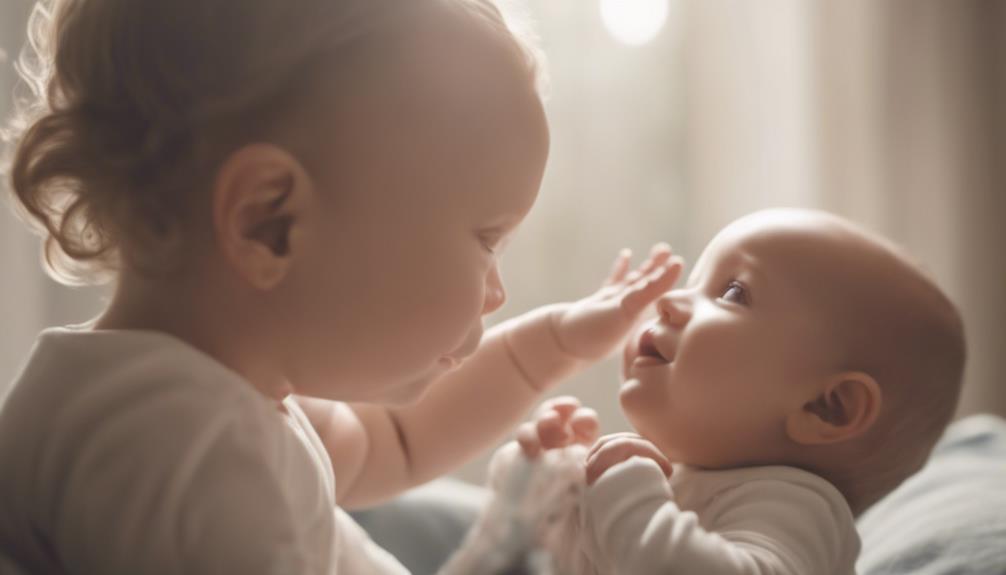
When does a baby typically extend their arms as a sign of seeking comfort?
Babies often reach out for comfort when they feel the need for physical reassurance, a clear indication of their bond and trust in their caregiver. This gesture showcases the love and attachment they've developed, seeking security and affection in times of distress.
Responding to a baby's outstretched arms with warmth and comfort not only provides the needed reassurance but also strengthens the bond between caregiver and child. It's vital to recognize and respond promptly to a baby's cues for comfort, as these moments play a significant role in building a secure attachment and fostering emotional well-being.
Demonstrates Separation Anxiety
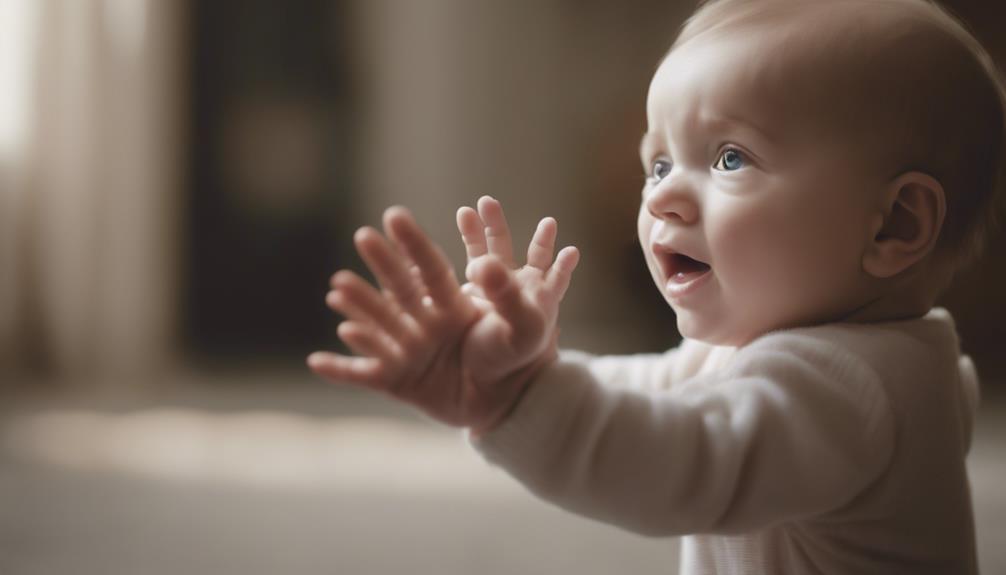
When your baby demonstrates separation anxiety, it shows their strong attachment and love for you through their reactions when you leave the room. This behavior is a clear indication of the emotional connection and bond they've with you.
Babies experiencing separation anxiety seek comfort, security, and reassurance from their primary caregiver, which highlights their reliance on you for emotional support. The distress they exhibit when you aren't present is a reflection of the depth of their attachment.
According to child development experts, separation anxiety typically peaks around 8-12 months as babies become more aware of your comings and goings. This phase signifies the trust and reliance your baby has developed towards you as their primary source of comfort and security.
The tears and excitement displayed upon your departure and return serve as heartwarming clues of your baby's love and emotional connection with you.
Imitates Your Actions
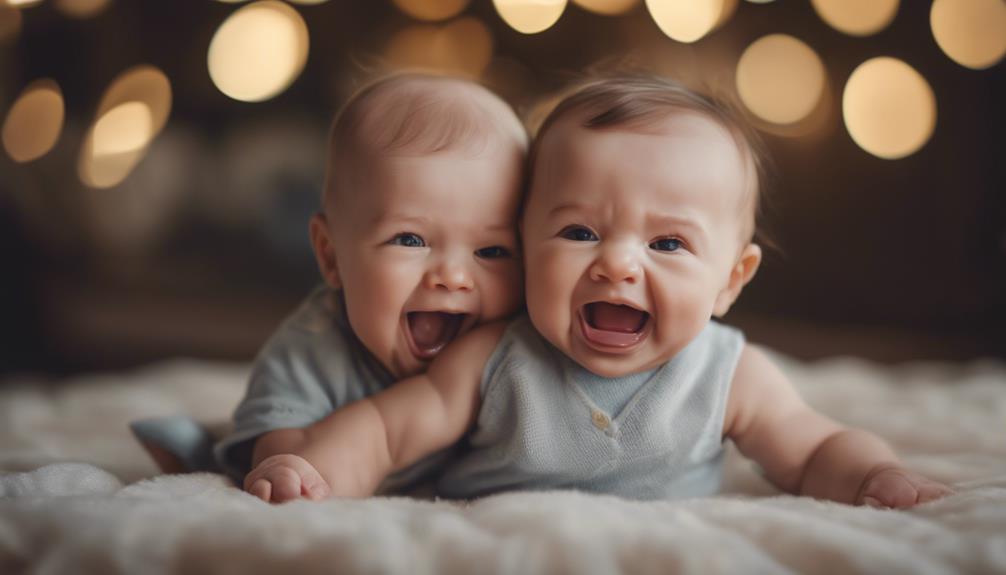
Babies often mirror your actions as a way to express affection and strengthen the emotional bond between you and them. When your baby imitates your actions, whether it's clapping their hands after you do or sticking out their tongue when you do, it signifies a significant developmental milestone for babies to express their feelings towards you.
Mimicking your gestures and facial expressions isn't merely a coincidence but a deliberate effort by your baby to show affection and build trust in your relationship. According to child development experts, this behavior is an essential developmental milestone for babies to express their feelings towards you.
Observing your baby imitate your actions is a heartwarming clue that they're learning from you and trying to communicate their love. Psychologist Dr. Smith notes, 'When babies mimic their caregivers, it demonstrates their understanding of social cues and desire for connection.' So, next time you catch your little one copying your movements, remember that it's a beautiful display of their emotional trust and affection for you.
Seeks Reassurance and Security
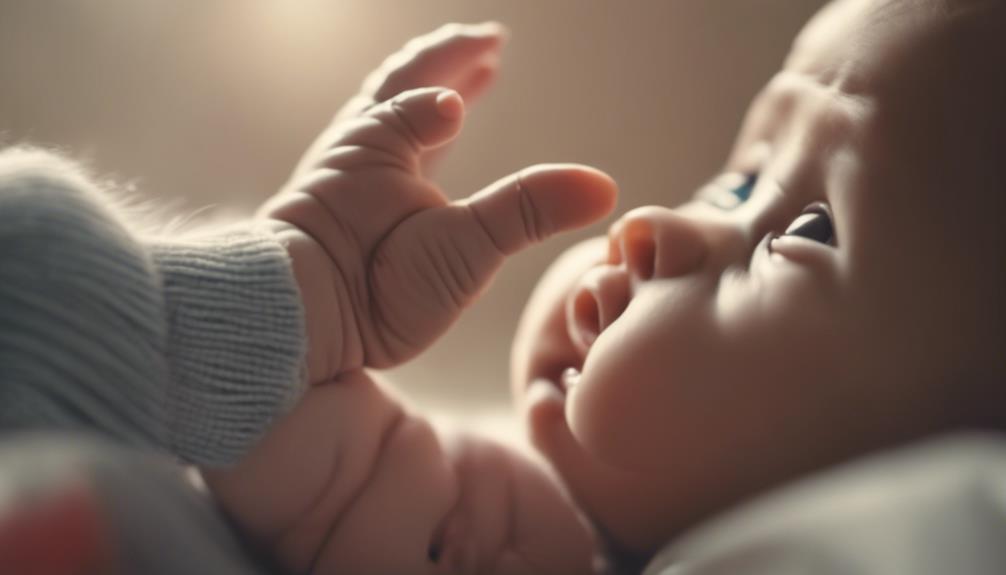
Seeking reassurance and security from their caregivers is a natural and essential behavior for infants. Babies express their need for affection, attachment, and trust through various cues.
Seeking comfort in your presence is a clear sign of love and closeness. When a baby holds out their arms to be picked up, they aren't just seeking physical contact but also showing their trust in you. This act of reaching out demonstrates a desire for security and reassurance that you're there for them.
Wanting to be held and comforted by their parents is another way babies seek reassurance and affection, displaying their attachment to those who care for them. By expressing their need for closeness and comfort, babies communicate their deep-rooted trust in their caregivers and their reliance on them for security and love.
Understanding and responding to these signals play an essential role in building a strong bond with your baby.
Frequently Asked Questions
How Do You Know if Your Baby Feels Loved?
You know your baby feels loved when they make eye contact, smile, and reach out to you. They show affection through responsive smiles and excitement when seeing you, seeking comfort and security, and displaying joy.
How Can I Tell if My Baby Loves Me?
You can tell if your baby loves you by their smiles, eye contact, and coos. Feeling relaxed in your arms, responding to your voice, and showing joy when you're around are all signs of their affection.
How to Tell if Baby Trusts You?
To tell if baby trusts you, tune into their tiny gestures. Tender touches, seeking solace, and responding radiantly reveal the robust bond. Your presence provides peace, their preference proves profound trust.
Can Babies Feel the Love You Give Them?
Babies can absolutely feel the love you give them. Your cuddles, kisses, and attention create a strong bond. When they smile, seek comfort, and show attachment, it's their way of expressing love for you.
Conclusion
To sum up, the signs that your baby loves you're clear and heartwarming. From making eye contact to seeking physical closeness, your baby's actions speak volumes.
For example, Sarah, a first-time mother, noticed her baby reaching out for comfort whenever she was upset, showing a strong bond between them.
By recognizing these clues, you can feel reassured of the love and connection you share with your little one. Trust in the signs, and cherish the special bond you have with your baby.


